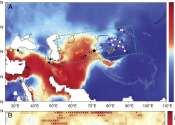Scientists capture X-rays from upward positive lightning
Globally, lightning is responsible for over 4,000 fatalities and billions of dollars in damage every year; Switzerland itself weathers up to 150,000 strikes annually. Understanding exactly how lightning forms is key for reducing ...









